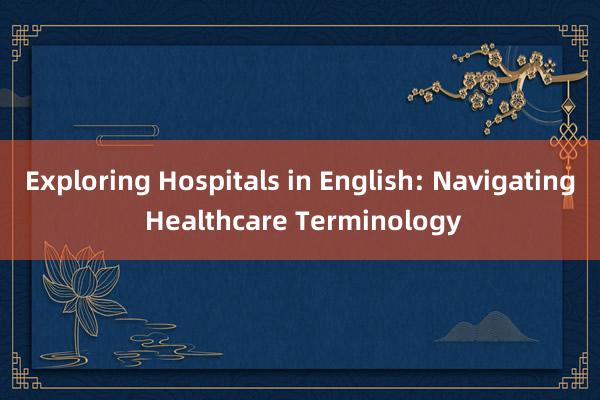时间:2024-10-23 15:13

### Exploring Hospitals in English: Navigating Healthcare Terminology
Navigating the healthcare system, particularly when it involves hospitals, can be daunting for anyone, especially when the language is not your native tongue. Hospitals in English-speaking countries, such as the United States, the United Kingdom, and Australia, operate within a complex network of medical terminology that can vary significantly from everyday language. This article aims to demystify some common healthcare terms and phrases, helping you better understand the hospital environment in English.
#### 1. **Medical Check-up vs. Physical Examination**
A **medical check-up** typically refers to a routine health assessment conducted by a doctor or healthcare professional, often including a review of your medical history, a physical examination, and possibly blood tests. On the other hand, a **physical examination** specifically involves a hands-on inspection of various body parts by the healthcare provider to assess health status, often focusing on symptoms or abnormalities noted during the patient's history.
#### 2. **Inpatient vs. Outpatient Care**
深圳达和有限公司**Inpatient care** is when a patient stays overnight at the hospital, requiring medical attention and treatment provided by healthcare staff. This can include surgery, 企业-利客艺咖啡有限公司 recovery, 潍坊福步贸易有限公司 and ongoing medical monitoring. **Outpatient care**,企业-裕特木坚果有限公司 conversely, involves receiving medical services without staying overnight. This could be for appointments, minor treatments, or follow-ups after an inpatient stay.
#### 3. **Prescription Medications**
Understanding prescriptions is crucial. The **pharmacy** is where you go to fill your prescription,四川德阳润宝印染有限责任公司 which will have detailed instructions on how much medicine to take, how often, and any potential side effects. Terms like **dosage** (the amount of medication), **frequency** (how often you take it), and **duration** (how long you take it) are essential to know.
#### 4. **Emergency Room (ER) vs. Urgent Care**
The **emergency room** is designed for immediate medical attention for life-threatening conditions or severe injuries. It’s open 24/7 and is equipped to handle critical situations. **Urgent care centers**, however, provide medical services for less urgent conditions, such as minor injuries or illnesses, and are typically open during regular business hours.
#### 5. **Radiology and Imaging**
**Radiology** encompasses a variety of diagnostic imaging techniques used to visualize internal structures of the body. Common procedures include X-rays, CT scans, MRIs, and ultrasounds. Each has its specific uses and limitations, which healthcare providers will explain based on your condition.
#### 6. **Surgery and Recovery**
**Surgery** involves invasive procedures to treat various health issues, often requiring a period of recovery. Understanding the type of surgery, anesthesia options, postoperative care, and rehabilitation is crucial. Recovery times can vary widely depending on the procedure.
#### Conclusion
Navigating the healthcare system in English requires familiarity with specific medical terminology. Whether you're dealing with appointments, understanding test results, or managing medications, having a grasp of these key concepts can significantly ease the process. Always feel free to ask healthcare professionals to clarify any terms or procedures you don't understand四川德阳润宝印染有限责任公司, ensuring you receive the best possible care.